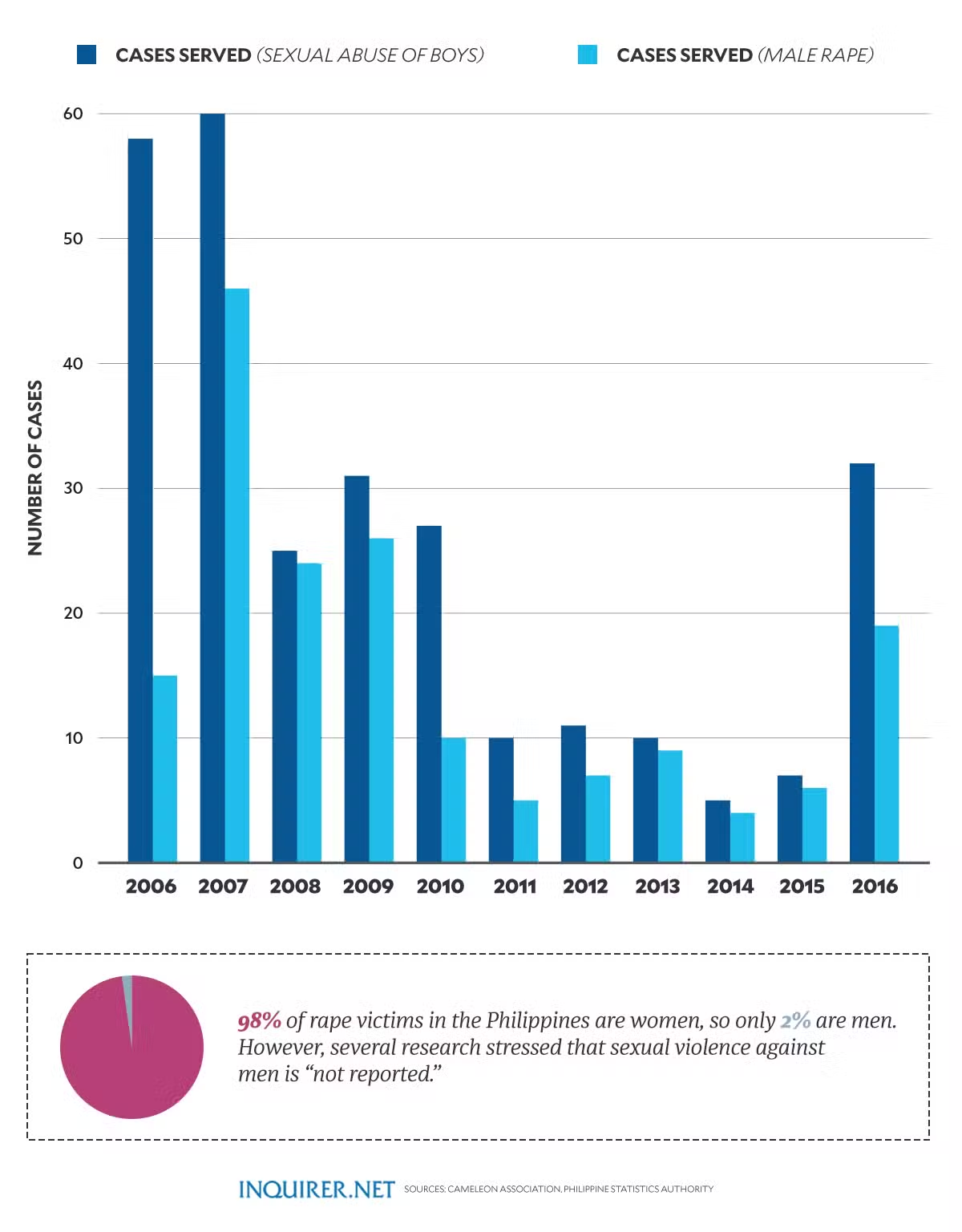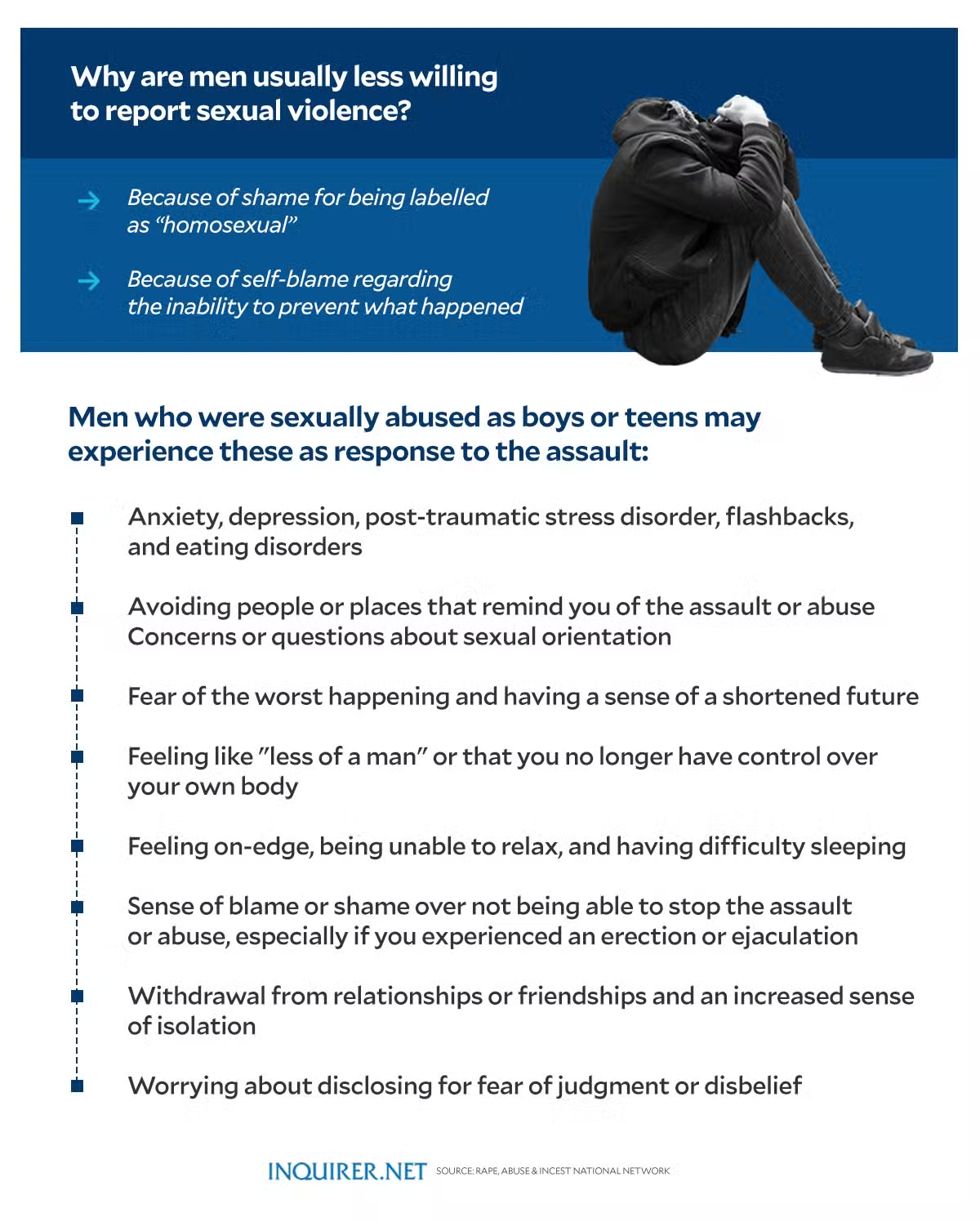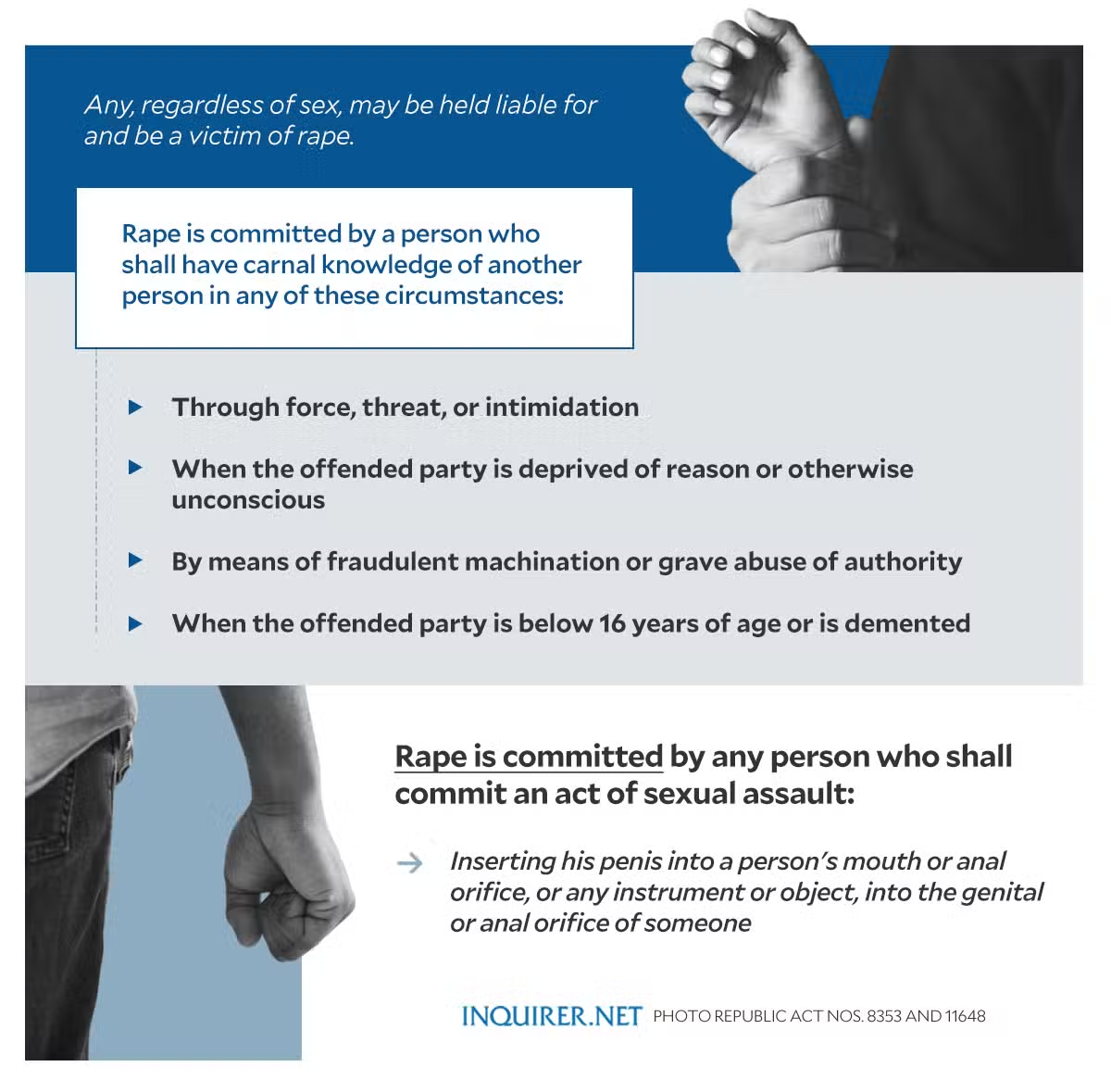May 29, 2025
MANILA – Men can be victims of rape, but because of “shame and self-blame,” cases often see no light, leaving victims in the dark while wrestling with severe stress.
Last week, INQUIRER.net reported that two junior officers of the Philippine Air Force filed rape and attempted rape cases against a two-star general, who is said to have sexually assaulted the two, who have served as his assistants.
READ: Military official faces rape complaints filed by 2 junior officers
The case, which happened on Jan. 29, saw light as the alleged victims lodged a complaint at the Office of the Prosecutor in Lipa City, Batangas on May 16.
READ: `No shortcuts’ in handling rape case vs military official -AFP
Right after, or on Jan. 30, the two men filed a complaint at the Office of Ethical Standards and Public Accountability, which, after investigating the allegation, stated that there was “prima facie evidence” of violations of the Articles of War.
The report led to the filing of charges at the Office of the Judge Advocate General, alleging that the general violated Articles 96 (Conduct Unbecoming an Officer) and 97 (Conduct Prejudicial to Good Order and Military Discipline).
RELATED STORY: AFP assures junior officers of protection amid rape charge vs superior
As the Armed Forces of the Philippines said, the two-star general has already been relieved from his post and is now in restricted custody, pointing out that it will not condone misconduct.
Since they are not only part of the military but citizens of the Philippines, as well, they also filed a criminal complaint, which immediately resulted in the conduct of a preliminary investigation.
But while the case saw light, most incidents of “male rape” in the Philippines remain in the dark, leaving thousands of victims in distress, with some even “engaging in self-harm.”
Silent pain
As the Cameleon Association said, 98 percent of rape victims in the Philippines are women, so only two percent are men. However, several studies already stressed that sexual violence against men is “underreported.”

GRAPHICS: PHILIPPINE DAILY INQUIRER
Based on data from the Philippine Statistics Authority from 2006 to 2016, or a period of 10 years only 171 cases of male rape and 276 cases of sexual abuse against men have been served.
RELATED STORY: AFP says senior military officer with rape case detained in his quarters
The Rape, Abuse and Incest National Network (RANN) said men who were sexually abused often experience anxiety, depression, stress, and even eating disorders, as a response to the violence committed against them.

GRAPHICS: PHILIPPINE DAILY INQUIRER
It said they tend to avoid people or places that remind them of the assault while having a feeling like “less of a man” or that they no longer have control over their own bodies.
Victims, RANN said, feel on-edge and have difficulty sleeping, they withdraw from relationships and have an increased sense of isolation and fear of the worst taking place again.
But despite all these, men are still less willing to report rape or sexual abuse.
As stated in the study “Sexual Abuse in Males: An Underreported Issue,” men are less willing to disclose their experience because of (1) shame for being labelled as homosexual and (2) self-blame regarding the inability to prevent what happened.
RANN pointed out that victims feel a sense of shame, and even blame, over “not being able to stop the assault or abuse, especially if [they] experienced an erection or ejaculation.”
No one’s safe
With existing laws in the Philippines, such as Republic Act (RA) No. 11648, which amended the Revised Penal Code and RA No. 8353, or the Anti-Rape Act, anyone, regardless of gender, may be held liable for and be a victim of rape.
Lawyer Quimberlyn Ranchez explained, however, that while rape, whether committed against a man or a woman, is punishable by law, there is a difference as to the manner of commission and the penalties imposed.
RELATED STORY: Gabriela: Ordinary civilians far `more vulnerable’ to military abuses
She told INQUIRER.net that male rape is recognized only through sexual assault, while female rape may be committed either through sexual intercourse or sexual assault.

GRAPHICS: PHILIPPINE DAILY INQUIRER
Sexual assault is committed when (a) the offender commits an act of sexual assault; (b) the act is carried out by inserting the penis into someone’s mouth or anal orifice or inserting any instrument into someone’s genital or anal orifice.
- Likewise, the act should be done in any of these circumstances:
- Through force of intimidation
- When the victim is deprived of reason or otherwise not conscious
- Through fraudulent machination or grave abuse of authority
- When the victim is below 16 years of age or demented
Ranchez stressed that only the second paragraph of Article 266-A of the Revised Penal Code “applies in cases of male rape, since rape by sexual intercourse legally requires that the victim be a woman.”
Likewise, “both men and women can commit both kinds of rape, provided that in rape by sexual intercourse, as stated in the first paragraph of Article 266-A, a man shall always be charged as a perpetrator.
Legal barriers
She said both male and female rape cases are covered by the law, so the prosecution “does not significantly differ in terms of the burden of proof, court procedures, or standards for conviction.”
“The prosecution, in both cases, must establish guilt beyond reasonable doubt, and the same rules on evidence, trial procedure, and due process apply equally, regardless of the victim’s gender,” Ranchez stated.
However, “while rape laws in the Philippines are technically gender-inclusive because of the amendments, male rape still faces more legal barriers since it is only prosecuted under a narrower and less severe category, which is sexual assault.
She said the penalty for rape through sexual intercourse is more severe than that for rape through sexual assault, which is only punishable by an imprisonment of six years and one day to 12 years.
Rape by sexual intercourse is punishable by reclusion perpetua, or imprisonment of 20 years and one day to 40 years.


